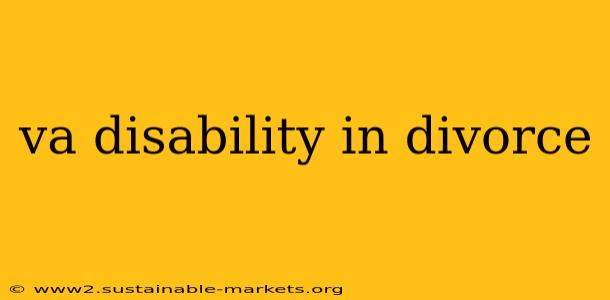Divorcing when one spouse receives VA disability benefits can be a complex process, fraught with legal and financial intricacies. Understanding how these benefits are treated in divorce proceedings is crucial for both parties involved. This guide provides a comprehensive overview of the issues surrounding VA disability and divorce, offering clarity and insight into a frequently misunderstood area of family law.
How VA Disability Benefits Are Treated in Divorce
A common misconception is that VA disability payments are considered marital property subject to division. This is generally not the case. Federal law protects VA disability benefits from being divided as marital assets in a divorce settlement. This protection stems from the principle that these benefits are intended to compensate veterans for injuries or illnesses sustained during their military service, not to be considered a shared marital asset.
However, the situation is not always straightforward. While the benefits themselves are protected, the income generated from those benefits can sometimes become a factor in determining spousal support (alimony) or child support.
Spousal Support (Alimony)
The court may consider the recipient's VA disability income when determining the amount and duration of spousal support. If one spouse receives significant disability payments, this might influence the judge's decision regarding alimony. However, the court cannot directly order a portion of the disability benefits to be paid as alimony.
Child Support
Similarly, VA disability benefits are typically not directly considered when calculating child support. However, the recipient's overall income, including disability payments, might be factored into the calculation to determine their ability to contribute to child support.
Other Assets and Debts in Divorce Cases Involving VA Disability
While the disability benefits themselves are generally protected, other assets and debts acquired during the marriage are subject to equitable distribution. This includes:
- Property acquired during the marriage: Homes, vehicles, bank accounts, investments – these are all considered marital assets and will be divided according to the laws of the specific state.
- Debts incurred during the marriage: Credit card debt, loans, and other financial obligations are typically divided in a divorce settlement.
It's crucial to note that the non-disability income of the veteran spouse is considered marital property and can be factored into the overall division of assets and the determination of spousal support.
Seeking Legal Counsel: The Importance of Professional Advice
Navigating the legal complexities of divorce when VA disability benefits are involved requires expert guidance. The laws and interpretations can vary significantly depending on the state and specific circumstances of the case. Consulting with a qualified family law attorney experienced in handling cases involving VA disability benefits is strongly recommended. A competent attorney can:
- Explain your rights and options: They will clearly explain how VA disability benefits are treated in your state and advise you on your best course of action.
- Negotiate a fair settlement: An attorney can help negotiate a fair and equitable distribution of assets and determine appropriate levels of spousal and child support.
- Represent you in court: If a settlement cannot be reached, your attorney will represent your interests in court.
Conclusion
VA disability benefits and divorce present a unique set of legal considerations. Understanding the nuances of how these benefits are treated is critical for both spouses to ensure a fair and legally sound resolution. Seeking professional legal advice is essential to protect your rights and interests throughout the divorce process. Remember, this information is for general guidance only and does not constitute legal advice. Always consult with a qualified attorney for personalized legal counsel.

